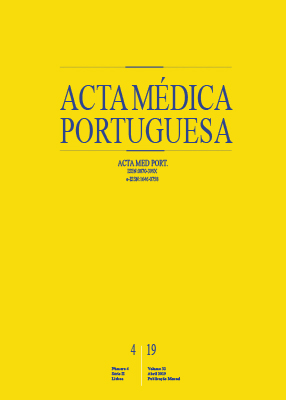Attitudes Towards Functional Foods Scale: Psychometric Proprieties and Adaptation for Use Among Adolescents
DOI:
https://doi.org/10.20344/amp.9284Keywords:
Adolescent, Azores, Functional Food, Life Style, Portugal, Psychometrics, Surveys and QuestionnairesAbstract
Introduction: Functional foods are those that promote health and well-being and/or decrease the risk of certain chronic diseases. It is known that young people’ knowledge about functional foods is low. The aim of this study is to assess the psychometric proprieties of the “Attitudes towards Functional Foods Scale” in a sample of adolescents and, based on that analysis, adapting the scale for its use among this population group.
Material and Methods: After a pre-test, the scale was applied to 340 students attending the 3rd cycle of basic education in Terceira island (Azores, Portugal), whose ages ranged between 11 and 19 years (mean = 14.0, standard deviation = 1.2). We analyzed the scale’s internal consistency and construct validity.
Results: The study of the psychometric proprieties led to the exclusion of one item. Cronbach’s alpha (α = 0.876) showed a good internal consistency of the scale, and factor analysis revealed that, as the original (adults) version, it presents an unifactorial structure.
Discussion: The scale showed to be an instrument easy and quick to apply among adolescents. We emphasize that its application should be preceded by the clarification on the concept of functional foods in order to ensure the adequacy of the answers.
Conclusion: This study has demonstrated the adequacy of the Attitudes Towards Functional Foods Scale to assess Portuguese adolescents’ perception regarding functional foods, highlighting the need of using its adapted version.
Downloads
Downloads
Published
How to Cite
Issue
Section
License
All the articles published in the AMP are open access and comply with the requirements of funding agencies or academic institutions. The AMP is governed by the terms of the Creative Commons ‘Attribution – Non-Commercial Use - (CC-BY-NC)’ license, regarding the use by third parties.
It is the author’s responsibility to obtain approval for the reproduction of figures, tables, etc. from other publications.
Upon acceptance of an article for publication, the authors will be asked to complete the ICMJE “Copyright Liability and Copyright Sharing Statement “(http://www.actamedicaportuguesa.com/info/AMP-NormasPublicacao.pdf) and the “Declaration of Potential Conflicts of Interest” (http:// www.icmje.org/conflicts-of-interest). An e-mail will be sent to the corresponding author to acknowledge receipt of the manuscript.
After publication, the authors are authorised to make their articles available in repositories of their institutions of origin, as long as they always mention where they were published and according to the Creative Commons license.









